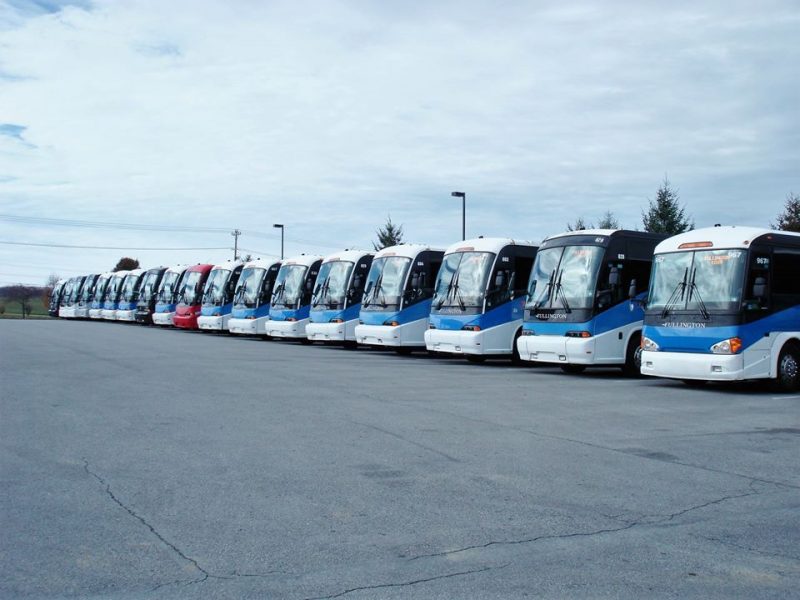Although most businesses have been impacted by the COVID-19 crisis, few have suffered as much as the bus industry including the locally-owned Fullington Auto Bus Company, which has been around for 112 years.
Chief Executive Officer Jonathan Berzas said as of May 12, the bus industry had lost $8 billion in revenue and 100,000 jobs.
Even with their company providing a variety of services in various capacities, it has still suffered.
Since the forced stop of their business in March, it’s had a severe drop in revenue, which he expects to be a total 40 percent reduction this year from last year.
A motorcoach costs approximately $600,000 and they have almost 80 in their fleet that have not been able to move in months.
Their tour division has been shut down indefinitely and he is unsure when that can start up again because many events they travel to have been cancelled.
“I do not foresee many tours going on,” he said.
The popular day trips to New York City have been on hold and even when they are able to travel there again, he doesn’t expect many people will want to go to the city.
Normally they can depend on “trickle down” business from sporting events or concerts but these venues are closed.
Some of local sports leagues have cancelled their seasons completely, which has hit the business “extremely hard” because they had contracts with them to carry the players.
One area that has opened up a bit is their VIP Division, which rents limousines and other vehicles for weddings or special events. They have seen some business the last two weeks but that has been sporadic, he said.
The buses were put to use for a short time providing transportation for National Guard troops in and out of Philadelphia into areas impacted by the protests and riots in awareness of the George Floyd death in Minneapolis by police.
The company is Department of Defense-certified, meaning it can carry military personnel when needed.
Its daily routes to cities in Pennsylvania and New York State are anticipated to start again on Aug. 16, but with a smaller schedule. Previously they had 13 daily runs between the states.
“We will be starting slowly with the main locations,” he said. “There is still a need for this.”
With routes opening up again, they will still be limited to only 25 or 26 people in a bus that can carry 55 passengers.
“The cost of the coach doesn’t change,” he explained making the cost of operation per person basis “quite high.”
Still Berzas said they are doing what they can to survive and is certain Fullington is “going to survive.”
Unfortunately, early on they had to make decisions to lay some employees off.
They were able to continue to pay their school bus drivers and the Paycheck Protection Plan helped to save some others. But they had to lay off 98 percent of their employees as those funds ran out.
“It was a tough decision but the employees understand,” he said.
The entire bus industry is looking for help and a Motorcoaches Rolling for Awareness Rally was held in Washington D.C. on May 13 with 400 companies participating, according to the American Bus Association.
There is an effort to highlight this industry that was forgotten in the original Coronavirus legislation that provided help for the airline and cruise industries.
“We are still trying to shed light on this and are lobbying to raise awareness,” Berzas said.
The ABA said there is legislature pending in the Senate, the Coronavirus Economic Relief for Transportation Services (CERTS) Act, which could provide $10 billion in funding “in the form of grants (no less than 50 percent of total funding) and other economic assistance” up to $5 billion in loans to “motorcoach operators, school bus companies, U.S. flag passenger vessel operators and other U.S. transportation service providers.”
“This money is sorely needed ASAP,” said ABA President and CEO Peter Pantuso in a recent press release.
“A recent ABA Foundation report stated that despite states moving forward with their re-opening phases, the motorcoach industry stands to lose $11 billion, nearly 75 percent of its annual revenue, because of COVID-19.
“These much-needed grants will help stave off absolute ruin for the industry. It will take years for the industry to recover back to its pre-coronavirus revenue.”
The ABA is asking everyone to support them by contacting their senators “while they are home for the July 4 recess” telling them to vote for this bill.
While Fullington waits for restrictions to be lifted, they have invested in “deep cleaning” products and disinfectant foggers that don’t leave any residue to spray the interior of the vehicles.
They are working now to decide how best to help front-line employees who have medical issues that prevent them from wearing masks.
Their school bus division is currently working with the school districts to determine how they will proceed in the fall, provided the schools are able to open at that time.
“The traveling public is still shy,” Berzas commented adding that he hopes they soon have the confidence to travel again.
“When you need us, we are here, ready and able.”
